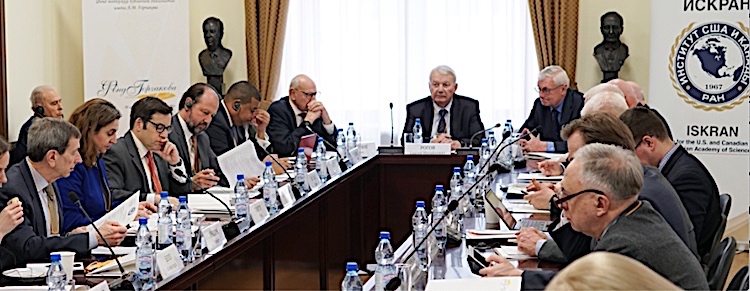By Daryl G. Kimball*

WASHINGTON , D.C. (IDN-INPS) – In the latest in a series of expert conferences and dialogues in Moscow and Washington, a group of distinguished U.S. and Russian experts released a public statement calling on U.S. and Russian officials to get back to the arms control negotiating table, with the first order of business being agreement on a five-year extension of the 2010 New Strategic Arms Reduction Treaty (New START), as allowed for in Article XIV of the treaty, and talks designed to head-off new arms competition in the wake of the likely termination of the 1987 Intermediate-Range Nuclear Forces (INF) Treaty. [2019-04-12]
The April 10 joint experts statement was endorsed by 29 individuals.
The latest meeting on the crisis in U.S.-Russian arms control was organized by the U.S. and Canadian Studies Institute of the Russian Academy of Sciences (ISKRAN) and held at the Gorkachev Institute in Moscow. Previous conferences in this series have been co-organized by ISKRAN, the Arms Control Association, the Deep Cuts Commission, the Nuclear Crisis Group, the U.S. National Academies of Science.
As the April 10 joint statement indicates, the participants also agreed that a productive dialogue in these areas would provide a foundation for progress on other issues of mutual concern, including: emerging technologies with potential strategic implications; new kinds of offensive, nuclear-capable systems; non-strategic nuclear weapons; missile defenses and third-country strategic capabilities.
It is also clear to many of us that there is simply not enough time—and not enough trust—between the U.S. and Russian governments to negotiate, let alone ratify, a complex, new, legally-binding treaty that addresses these difficult new issues before New START expires on February 5, 2021. Without the INF Treaty and without extension of New START, there would be no legally-binding limits on the world’s two largest nuclear arsenals for the first time since 1972.
Any proposals that might emerge from the Trump administration suggesting that China must join New START, or that Russia must agree to limits on tactical nuclear weapons, as a condition for New START extension should be recognized for what they are: disingenuous proposals designed to create a pretext for killing New START.
The formal joint statement from the U.S. and Russian experts, and the list of endorsers, is appended below.
Statement by Participants of the Russian-American Conference on Arms Control, April 9-10, 2019, Moscow
As American and Russian experts in national security affairs, we are deeply concerned by the deterioration of the international security environment, the prospect of heightened competition among major powers in the strategic realm, and the increased risk of military confrontation that could lead to the use of nuclear weapons. We encourage our two governments to counteract these disturbing developments and promote strategic stability, including by:
- Reaffirming the Reagan-Gorbachev understanding that a nuclear war cannot be won and should never be fought;
- Extending the New START Treaty until 2026 as allowed by article XIV of the Treaty;
- Ensuring that the likely end of the INF Treaty does not result in a new arms race;
- Holding regular, high-level talks to consider the implications for strategic stability and arms control of a range of technological and strategic developments, including:
- Emerging technologies with potential strategic implications;
- New kinds of offensive, nuclear-capable systems;
- Non-strategic nuclear weapons;
- Conventional systems with strategic implications, including missile defenses and conventional strike systems; and
- Third-country strategic capabilities.
We believe our two countries should also work together and with other parties to the nuclear Nonproliferation Treaty to ensure the success of the 2020 NPT Review Conference.
* Daryl G. Kimball is Executive Director, Arms Control Association. He was one of the experts who participated in the U.S.-Russian dialogue. [IDN-InDepthNews – 12 April 2019]
Image: Reversing the financial interests in fossil fuels and the nuclear arms race. Credit: nuclearweaponsmoney.org
IDN is flagship agency of the International Press Syndicate.
facebook.com/IDN.GoingDeeper – twitter.com/nukeabolition






